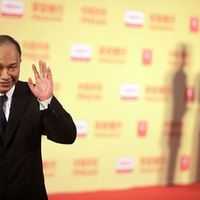A Chinese Cinema From Within Europe?
The portrayal of China in film has long been a fascination in Europe. However, the traditional reliance on Euro-American filmmakers to reconstruct the image of China has, since a few decades, given way to an import of films created by Mainland Chinese filmmakers themselves.
This shift has taken shape steadily and has interestingly encouraged a handful of Chinese filmmakers who are based in Europe to have their say in cinematic representations of their homeland.
The Chinese Filmmaker between Europe and China
Film directors Dai Sijie and Guo Xiaolu have moved from China to France and the United Kingdom respectively but at different times. Dai (who also experienced the Cultural Revolution in his early adult life) left for France in 1984, whilst Guo left China more recently in 2002 for the UK.
Both have since made films that are strongly influenced by their affinity to their Chinese homeland. Interestingly enough, the works of these two filmmakers echo developments and patterns in contemporary Chinese cinema from the Mainland.
Dai’s preoccupation with romantic landscape settings (La fille du botaniste chinois, 2006) and the Cultural Revolution as a context (Balzac et la petite tailleuse chinoise, 2002), are reminiscent of some of the films made by Zhang Yimou, Beijing Film Academy’s “Fifth Generation” filmmaker.
Guo’s concern with the social damage behind China’s modern front (The Concrete Revolution, 2004) however, falls more in line with her “Sixth Generation” counterparts on the Mainland, such as Jia Zhangke. Such a migration of film narratives or visual styles expresses the capability of Chinese cinema to transcend the cultural boundaries between China and Europe. This however, does not mean that works by Chinese filmmakers who are based in Europe cannot be differentiated from those by filmmakers from Mainland China.
An important quality for such a differentiation is the use of home-seeking or homecoming journeys, or homelessness, as a subject matter or theme in films directed by the displaced filmmaker who does not live in his or her country of origin.
Equally special to films created by these filmmakers is the building of an overall mood of being located at the intersection of cultures, practices, or languages. The characters of the films for instance, are sometimes double or split. Entire crews of such films for example,
usually also consist of both Chinese and European persons. This is not surprising since these filmmakers who straddle between China and Europe, are themselves split in their cultural orientations.
Lastly, and perhaps the most unique quality that differentiates films like those of Dai and Guo from their Mainland Chinese counterparts, is a strong sense of the filmmakers inscribing their biographies onto their films. The author, narrator and subject in the film very often coincide. The identity of the filmmaker in this sense is therefore relevant.
Europe and Chinese Cinema
The popularity of films like those of Dai and Guo are supported by an emerging interest in Mainland Chinese cinema in Europe. The first time Chinese cinema appeared in Europe after the Cultural Revolution was in a film festival in Pesaro, Italy in 1978.
Today, Chinese films are screened in smaller-scale film festivals like the Chinese Film and Culture Festival in Cologne, the Overseas Chinese Film Festival in Glasgow or the Cinema China in Edinburgh. Chinese cinema has also become more popular in bigger-scale European film festivals like the Berlinale or the Venice Film Festival.
The fascination with China by European filmmakers themselves has for a long time been translated into popular China-themed films ranging from Joseph von Sternberg’s Shanghai Express (1932) to Bernardo Bertolucci’s The Last Emperor (1987). But the tides have changed today. Not only are Chinese films more demanded in Europe than before, the few Chinese filmmakers that reside there are also beginning to find a growing audience that welcomes a Chinese cinema coming from within Europe.
by Huifen Joann Hu
Similar content
By Kerrine Goh
29 Dec 2006
By Kerrine Goh
28 Oct 2006
By Kerrine Goh
29 Nov 2007
posted on
13 Aug 2010
posted on
06 Jun 2011
posted on
12 Aug 2013


